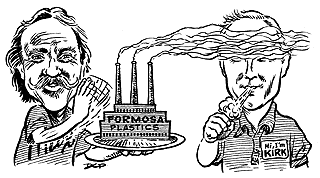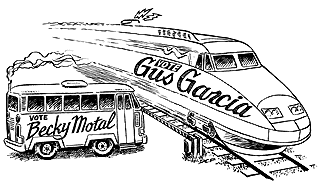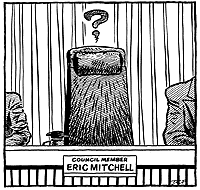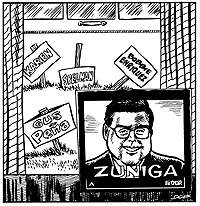MAYOR: Watson's Plastic Past
By Alex de Marban, Fri., May 2, 1997
|
|
Specifically, the former councilmember of nine years complained that the local daily never mentioned his plan to reform Capital Metro (elect the board and reinstitute free rides) and failed to do an analysis of the latest Contributions and Expenditures reports before early voting ended which would have shown how, according to the Nofziger campaign, Watson is "buying the election." Indeed, the latest C&Es, filed last week, show Watson extending his lead over both candidates. He's raised more than $609,560. Reynolds has raised $350,698. Nofziger made up a little ground and now has raised a hopeless $5,491. By the way, although Nofziger's press conference was on the front lawn of the local daily, no Statesman reporter bothered to show. Ouch.
As expected, the race has boiled down to developers-versus-environmentalists, with the left-leaning candidates, Nofziger and Watson, vying for the green stamp of approval. Or, more accurately, Nofziger is attempting to wrest the green ribbon from Watson -- witness last week's Formosa Plastics Corp. flap, which Nofziger is using in his efforts to cast doubt on Watson's environmental record. At a Barton Springs press conference last week, Nofziger pointed out that Watson, while chair of the Texas Air Control Board in 1992, voted to approve a hotly debated expansion permit for the once-notorious plastics producing company. This, despite the fact that Formosa's plant, located in the Lavaca Bay in Point Comfort, Texas, had repeatedly violated state pollution controls.
Watson maintains that because a hearings examiner had ruled that Formosa had met all the legal requirements, a permit rejection would have been appealed. "I could have abstained, but it would have been legally erroneous," Watson explains. "I did the right thing based on the law." But try as the Watson campaign might to put the nasty business behind them, Rick Abraham, executive director of the Texans United Education Fund, fired off an angry April 26 letter to the Chronicle to further fan the Formosa flames. Abraham's statewide non-profit was part of a coalition that opposed the Formosa permit in 1992, and he skewers Watson for voting in Formosa's favor.
Abraham says that it's ridiculous for Watson to claim that he was bound by law to vote for the permit -- he could easily have abstained, as did another boardmember, Dr. Suzanne Ahn. After the vote, Ahn explained her abstention to the Victoria Advocate this way: "I'm sure Formosa is doing the best they can, but these supporters [Formosa employees] might come back before this board 30 years from now because they have cancer."
Thus, Watson provided the fifth vote on the nine-member board, the swing vote that allowed Formosa's permit. He decided that hands-on oversight and public reprimand was the only option to check Formosa's pollutive habits. Last week, Watson told this paper that his efforts "obviously led to a greater compliance record."
But Abraham says that, "Within a month of Watson's vote, Formosa had yet another toxic air release which closed off a state highway.... Citizens in Point Comfort eventually sued Formosa over the continuing air pollution. If there has been progress at Formosa, it is because of years of hard work by Diane Wilson, Calhoun County Resource Watch, Texans United and others -- not because of the public posturing of one government bureaucrat." (Jim Blackburn, an attorney for Calhoun County Resource Watch, a Formosa watchdog, contibuted to Watson's campaign, and he confirms that the plastics company has cleaned up its act -- it has not committed a major violation since 1993.)
The letter further alleges that the reason Watson granted the permit was because Governor Ann Richards, who had appointed Watson to the board and received a $6,000 financial contribution from Formosa, wanted the approval. Watson laughs and says, "Richards never told me how to vote, and if she had tried, I would have told her she was out of line." Watson campaign consultant David Butts says that he is especially offended by the allegation of Richards' connection. "That is the most strained analysis -- Richards got contributions from everybody," Butts says.
The enviros-for-Watson crowd -- including the Sierra Club's Neil Carmen, who was directly involved in the fight against Formosa -- are mad as hornets about the allegations, and are lining up to stand behind their man. Brigid Shea, who served with Nofziger on the city council, even took some air time during her Wednesday morning radio spot on KGSR to criticize the Nofziger campaign. She sees the attack as unfair harping on "just one vote." And as for Abraham, Austin environmentalists roll their eyes when they hear his name, intimating that Abraham is a divisive troublemaker.
However, Abraham says that the problem people have with Texans United is that it's an independent, non-partisan organization. Texans United "represents both Democrats and Republicans who are suffering from companies that pollute," he says. "We do not have our noses up the butts of the Democratic party politicians like the mainstream groups in Austin do."
Texans United board member Jim Baldauf of Austin adds that Watson's enviro supporters are simply unable to admit that someone they support could possibly have a tarnished background. "They have such a psychological investment in their purity of image that they can't bear to see that their child is just an old crony," Balduf says.
Abraham continues: "I don't know Max Nofziger. Watson might be the better choice for mayor -- I don't know. I just think Watson should own up to the fact that he made a mistake on Formosa.."
PLACE 2: Discussing Gus
by Mike Clark-Madison
|
|
The de facto challenger for Place 2, running against Mayor Pro Tem Gus Garcia in his bid to jump across the council dais, issued a press release last week trashing Garcia for accepting campaign contributions from Capital Metro board chairman Michael Von Ohlen. "I am deeply concerned that Mr. Garcia is taking money from the head of an agency he is supposed to oversee," Motal is quoted as saying in her release. "Then he looks the other way while chaos develops."
"How many more MILLIONS must go down the drain?" her press release asks (emphasis hers). Motal's shrieking attack echoes Ronney Reynolds' own attempts to ride the Cap Met train, and like Reynolds, Motal is taking the bus because the train seems to have left the station without her, with Garcia (and Kirk Watson) in the club car. Having failed to win support among Austin's mainstream with her own ideas, Motal hopes that the very unpopular Capital Metro will stain her very popular opponent. Or, as Garcia puts it, "The conservative establishment has decided there's only one way for their candidates to win this election, and that's to take attention away from the real issues."
Unfortunately for Motal's thesis, the Council's ability to "oversee" Cap Met amounts to little more than squat -- although they appoint five of seven board members, they have no control over them once appointed, often to their chagrin. Since Capital Metro was created by the state, approved (along with its tax) by citizen vote in 1985, and manages (or mismanages) its own day-to-day affairs, Motal is charging Garcia with failing at a job he does not have. (Or perhaps she's attacking Von Ohlen for trying to buy favors he does not need. It's hard to tell from the press release.) "It's not like we tell Capital Metro every morning what they should do next," Garcia points out.
What's more, Motal also "strongly endorses" Rep. Terry Keel's legislation to reform Capital Metro by, among other things, direct popular election of the board, thus eliminating the meager "oversight" authority the city has now. So Motal is telling voters to not trust Garcia's judgment, but to trust hers, if she wins, even less. Go figure.
Further adding to the foolishness, her press rant includes copies of Garcia's contributions reports, with big loud circles around not only Von Ohlen's donations but also much smaller gifts from Capital Metro General Manager Justin Augustine and from an administrative assistant (!) at the transit authority. On the same page as the latter -- it's hard to see under the big circle, but it's there -- is a $100 gift to the Garcia campaign from none other than Manuel Zuniga, Motal's fellow conservative and ostensible slate-mate.
And one more thing: Motal's own C&Es are larded with contributions from colleagues at her place of employment -- the Lower Colorado River Authority, another autonomous agency with undue influence on Austinites' lives, especially with the fate of the Electric Utility on the table, and from whom Motal draws a tidy paycheck. The conflict of interest here, which would seemingly dwarf any posed by Von Ohlen's contributions to Garcia, was enough to give even the Statesman pause (after all, Dr. Charles Urdy felt it necessary to resign his council seat upon taking a job with LCRA), but Motal has repeatedly denied that any conflict exists, and she intends to keep her job if elected.
PLACE 6: Willie or Won't He?
by Kayte VanScoy
|
|
T-shirted supporters dutifully applauding as if it were a campaign convention (see "Council Watch" and "Naked City"). Not to be outdone by Mitchell's vainglorious theatrics, Lewis launched his anti-Mitchell television offense over the weekend, proving that the Lewis campaign realizes it is time to do more than just get his name out.
Lewis' campaign sank its entire TV budget into a Dean Rindy spin on Mitchell's well-publicized voting record and city contract profiteering. "He missed 176 votes... but Mitchell has shown up to vote for city contracts with companies that hired his insurance firm," the voiceover states, while the picture zeroes in on the contract's $43,000 bottom line. The ad's persuasive capper: "Willie Lewis, he'll show up for work," is deliberately hard for Mitchell to counter.
For an incumbent posturing calculated over-confidence, Mitchell has certainly been on the defensive of late. Perhaps with good reason, since Lewis is not surrendering in his campaign's uphill battle. Obviously still smarting from the recent attention paid in the Chronicle and American-Statesman to his council voting record, Mitchell nervously joked during Thursday's meeting, "I'm back," after briefly stepping off the dias. He may have been smiling, but he was also unusually civil during the hours of politically charged public hearings, and was religiously present throughout the 11-hour meeting. Even more telling is Mitchell's ad in the Chronicle this week touting his appointments to city boards which, the ad says, "include men and women who are involved in the gay civil rights struggle." The ad is clearly addressing the negative impact of his alleged "faggot" threats to Councilmember Daryl Slusher's aide, Robin Cravey. (Mitchell will not comment on the incident.)
Also threatening for Mitchell is Lewis' steady improvement throughout the campaign from a shy and tongue-tied neighborhood leader to a politician with citywide appeal. Lewis recently proved he could hold his own in a televised frame-up masquerading as a "forum" called by Mitchell flag waver, the Rev. Frank Garrett. Admirably fielding pro-Mitchell set-ups like "between funding S.O.S. and developing East Austin, which would you choose?," Lewis politely endured the ludicrous ordeal. In a later attempt to drum up support for Mitchell's pet Central City Entertainment Center, an obviously scripted audience plant emotionally confessed that he spent most of his free time selling drugs. Unfazed, Lewis wisely replied that the man clearly needed job training more than recreation.
There is the possibility that the Lewis campaign's focus on Mitchell's negatives rather than Lewis's strong points will backfire. However, the campaign is sure to get a boost during the last few days of the race as groups like the Women's Political Caucus and S.O.S. tap their funding reserves to advertise their own endorsements. But while Lewis' name ID may benefit from its proximity on endorsement slates to popular candidates like Kirk Watson and Gus Garcia, bettors are putting their money on Mitchell.
PLACE 5: Money Talks
by Amy Smith
|
|
The other two leading candidates -- Bill Spelman and Bobbie Enriquez -- collected $22,150 and $9,180, respectively -- during the same reporting period. A $10,000 tip from every local liberal candidate's dream -- enviro rocker Don Henley -- boosted Spelman's bank account, and now it looks like some TV time is in order to give the candidate some much-needed visibility.
"There is something about TV that gives a candidate legitimacy in the public mind," said Mike Blizzard, Spelman's campaign manager. "That's unfortunate because there is so much more to a candidate than 30-second sound bites."
Then again, some candidates come off better when they keep their traps shut. Zuniga, for instance, is letting his money talk for him in a high-dollar TV blitz spilling across the airwaves. No doubt Zuniga's handlers are doing their darndest to muzzle their foot-in-mouth client in the remaining hours before election day. (Best to avoid a repeat of the "I'm worth $720-an-hour" remark.) Zuniga's commercials are of the touchy-feely variety, complete with sappy music and baby-kissing.
Enriquez, for her part, continues to hammer home her "forgotten agenda" platform and has turned up the heat on her campaign rhetoric that, for the first time, goes on the offensive by measuring her own abilities against those of her competitors. Meanwhile, Karen Hadden's grassroots campaign seems to have saturated the yard-sign market, and Gus Peña keeps on pounding the pavement with his "unity for a community" message.
Truth be told, the five-way contest hasn't exactly been a show-stopper, save for two noteworthy issues: For one, most of the candidates have targeted Zuniga as the bad guy. He's the strongest and wealthiest of the bunch, and he also happens to be closely aligned with development interests. Secondly, there is the whole race issue -- that is, the question of whether voters should continue the time-honored tradition of electing a Hispanic to the Place 5 seat, or ignore the gentleman's agreement altogether with a vote for either Spelman, an LBJ School associate professor, or Hadden, a school teacher. Both are of the environmental-progressive persuasion who have vowed to initiate work toward creating single-member voting districts to ensure equal representation.
Enriquez, on the other hand, argues that she's the best candidate for the job because she can maintain Hispanic representation in Place 5 while working for the same common cause issues that compelled Spelman and Hadden to enter the race. Plus, Enriquez adds, many of the progressive folks' agendas stop at I-35.
Ironically, the Austin Tejano Democrats were unable to reach a two-thirds-majority vote for an endorsement in the traditionally Hispanic race. The vote deadlocked between Zuniga and Enriquez, negating the group's ability to throw its support behind a single candidate.
Got something to say on the subject? Send a letter to the editor.










